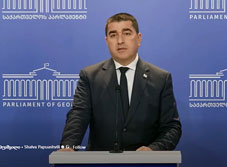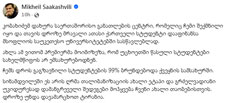Papuashvili: Constitutional Lawsuit on Banning Political Parties Ready for Submission

"The lawsuit is prepared and undergoing final legal adjustments. We will discuss it at today's majority meeting, and afterward, it will be ready for submission," Papuashvili said.
Responding to criticism about the constitutionality of such a move, Papuashvili insisted that the Georgian Constitution allows for banning parties that act against the state's fundamental principles. "This has always existed in our Constitution and in the laws of any democratic country," he noted.
He accused some non-governmental organizations and opposition figures of hypocrisy, referencing a past initiative by former Public Defender Nino Lomjaria. "If anyone has doubts about constitutionality, I advise Lelo to consult Nino Lomjaria. She once prepared a similar constitutional lawsuit and even shared it with opposition MPs to have it filed," Papuashvili said, claiming that current criticism comes from "foreign-funded groups" spreading "absurd legal interpretations."
Explaining the rationale behind the lawsuit, Papuashvili said it aims to uphold what he called the principle of "defensive democracy." According to him, the goal is to protect the state from forces that seek to use democratic tools to undermine it.
"The logic is clear: we see parties that act to harm Georgia, organize attempts to overthrow the government, spread war propaganda, and challenge the country's territorial integrity," he stated. "Our main target is those political parties that are actively engaged in anti-Georgian and anti-constitutional actions, with a real potential to destabilize the country."
Papuashvili added that the proposed measures align with international practice. "This is a Western-style approach based on defensive democracy. Similar bans have been implemented in Moldova, Ukraine, and even Germany, where parties and organizations can be outlawed if they work against democratic order," he said.
Saakashvili Slams Closure of International Education Center, Calls Move 'Deep Talibanization'

In a post on social media, Saakashvili called the decision "a new stage of deep Talibanization," warning that it would have "extremely destructive long-term consequences" for future generations.
"The International Education Center, which I established, once helped thousands of Georgian students study at the world's best universities," Saakashvili wrote. "Now this so-called prime minister claims that students who went abroad did not serve the state. During my time, 99% of them returned to serve the country."
He argued that the closure represents a broader assault on education and openness, framing it as part of what he described as a growing authoritarian trend under the Georgian Dream government. "We must defeat tyranny in time," he added.
The International Education Center was created under Saakashvili's administration to provide scholarships for Georgian students to pursue degrees abroad, with the expectation that graduates would later contribute to the country's development upon their return.
